

What’s really keeping women from breast-feeding? The answers may surprise you. After her own struggle to breast-feed her daughter, Kimberly Seals Allers began exploring why so many American women opt out of breast-feeding.
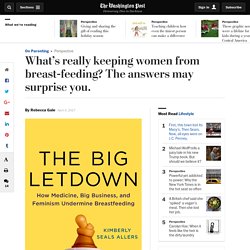
Why had she been discharged from the hospital with a gift bag full of formula? Why had a pediatrician encouraged her to supplement breast-feeding with formula? And why did she question her body’s ability to produce enough milk for her child? “It was doubt,” said Allers. “Doubt created by the formula industry. … It’s a very effective marketing tactic.” Allers’s book “The Big Letdown,” (St.
FIB etc comebacks. Feminism. Who code. Formula companies. Mommy wars. Why baby formula has no place in a sustainable future. Of all the things that we feed to our children, breast milk may be the best: custom-designed for each and every baby, locally sourced, available on-demand and free.
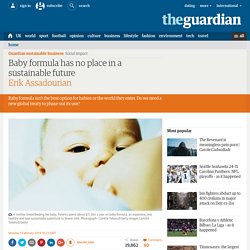
Yet parents spend about $11.5bn a year on baby formula, an expensive, less healthy and less sustainable substitute. In an effort to change that, the World Health Organization (WHO) and UNICEF have, for the past 20 years, worked to make hospitals around the world more "baby-friendly". This Baby-Friendly Hospital Initiative has focused especially on reducing formula use by new mothers. A variety of creative strategies are part of this: Nurture Project International - Journal. Mothers need support not pressure. What has breastfeeding got to do with Jamie Oliver? So, following his recent win on the sugar tax, Jamie Oliver has turned his attention to breastfeeding – see here.
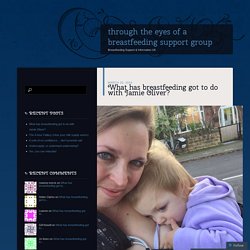
What has breastfeeding got to do with him, you might ask? It seems that’s what everyone is thinking. But why shouldn’t it have something to do with him? Is he not a fellow mammal, human and parent? And one with a keen interest in infant nutrition at that? There are plenty other male celebrities have also showed themselves to be pro-breastfeeding without being the target of hate filled messages and articles. Through the eyes of a breastfeeding support group. Part two of our series, ‘The Subtle Undermining of Breastfeeding’.
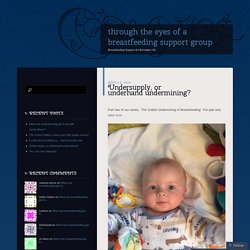
For part one, click here. Does he look like his milk isn’t good enough? I logged onto a Facebook breastfeeding support group the other day and immediately saw a post from a mother who was worried that she didn’t have enough milk for her baby. Her baby was feeding almost constantly and very fussy, her breasts were no longer engorged and had become soft almost overnight, and she was unable to express much milk.
Understandably, she was very stressed and was looking for support to get things back on track. All the evidence shows that the vast majority of women are physiologically able to produce a full milk supply. World Alliance for Breastfeeding Action : WABA. WABA Activity Sheet 4 Breastfeeding: A Feminist Issue Penny Van Esterik Breastfeeding is an important women's issue, human rights issue, and feminist issue, since breastfeeding empowers women and contributes to gender equality.
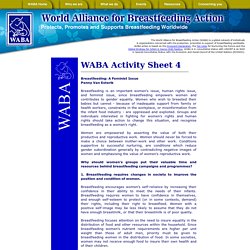
Women who wish to breasted their babies but cannot - because of inadequate support from family or health workers, constraints in the workplace, or misinformation from the infant food industry - are oppressed and exploited. Groups and individuals interested in fighting for women's rights and human rights should take action to change this situation, and recognise breastfeeding as a woman's right. Women are empowered by asserting the value of both their productive and reproductive work. Feedingreport. Dr.Jack Newman - Photos du journal. Inverted language of bf. Watch Your Language!
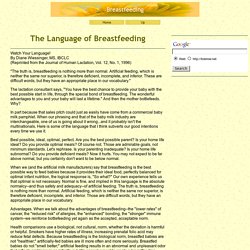
By Diane Wiessinger, MS, IBCLC (Reprinted from the Journal of Human Lactation, Vol. 12, No. 1, 1996) "The truth is, breastfeeding is nothing more than normal. Artificial feeding, which is neither the same nor superior, is therefore deficient, incomplete, and inferior. These are difficult words, but they have an appropriate place in our vocabulary. " The lactation consultant says, "You have the best chance to provide your baby with the best possible start in life, through the special bond of breastfeeding. An Open Letter to Gina Ford – Author of The Contented Little Baby Book. Dear Gina, I was interested to learn of your latest book “The Contented Mother’s Guide” (via this Daily Mail article: I haven’t read your book yet so am only commenting on what appears to be the press releases sent out by your publishers and the resulting interpretations of the media, but I do plan to read your book in full as soon as possible as I like to keep in touch with what is happening in the world of popular parenting literature.
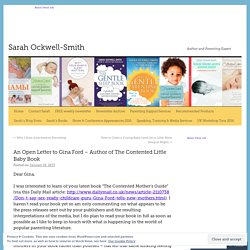
For now though what I have read – what I believe may be comments from mothers in your book rather than yourself – has left that same sinking feeling in my heart that I was left with when I read your Contented Little Baby Book almost ten years ago as a nervous and naive new first time mother. Back then I wasn’t sure why your book made me feel so uncomfortable, particularly as all my other new mummy friends were raving about it, I did try your routines and your approaches to sleep, but I cried as much – if not more – than my baby did. Kind regards Sarah.